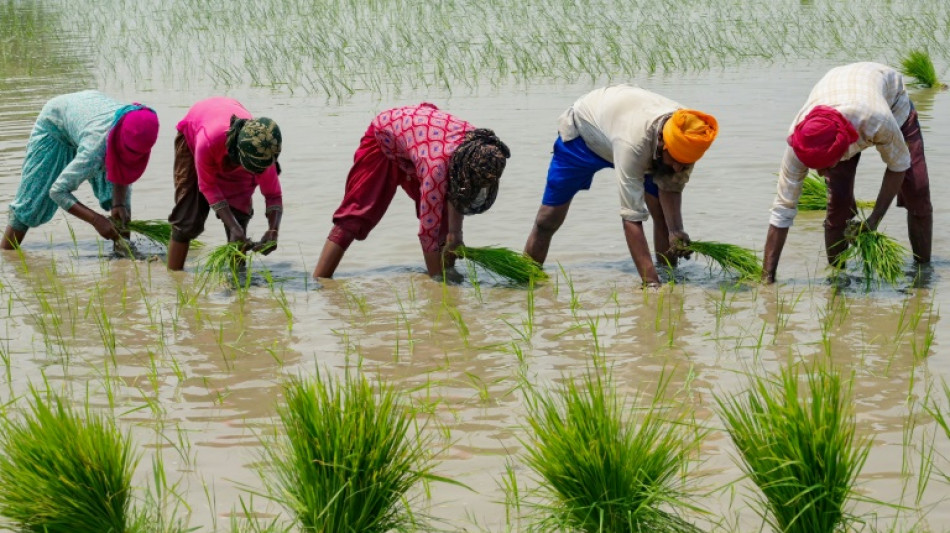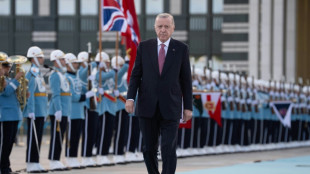
-
 Argentina beat Scotland after stunning fightback
Argentina beat Scotland after stunning fightback
-
Pope urges leaders not to leave poor behind

-
 Pressure will boost Germany in 'knockout' Slovakia clash, says Nagelsmann
Pressure will boost Germany in 'knockout' Slovakia clash, says Nagelsmann
-
Ecuador votes on hosting foreign bases as Noboa eyes more powers

-
 Portugal qualify for 2026 World Cup by thrashing Armenia
Portugal qualify for 2026 World Cup by thrashing Armenia
-
Greece to supply winter gas to war battered Ukraine

-
 India and Pakistan blind women show spirit of cricket with handshakes
India and Pakistan blind women show spirit of cricket with handshakes
-
Ukraine signs deal with Greece for winter deliveries of US gas

-
 George glad England backed-up haka response with New Zealand win
George glad England backed-up haka response with New Zealand win
-
McIlroy loses playoff but clinches seventh Race to Dubai title

-
 Ecuador votes on reforms as Noboa eyes anti-crime ramp-up
Ecuador votes on reforms as Noboa eyes anti-crime ramp-up
-
Chileans vote in elections dominated by crime, immigration

-
 Turkey seeks to host next COP as co-presidency plans falter
Turkey seeks to host next COP as co-presidency plans falter
-
Bezzecchi claims Valencia MotoGP victory in season-ender

-
 Wasim leads as Pakistan dismiss Sri Lanka for 211 in third ODI
Wasim leads as Pakistan dismiss Sri Lanka for 211 in third ODI
-
Serbia avoiding 'confiscation' of Russian shares in oil firm NIS

-
 Coach Gambhir questions 'technique and temperament' of Indian batters
Coach Gambhir questions 'technique and temperament' of Indian batters
-
Braathen wins Levi slalom for first Brazilian World Cup victory

-
 Rory McIlroy wins seventh Race to Dubai title
Rory McIlroy wins seventh Race to Dubai title
-
Samsung plans $310 bn investment to power AI expansion

-
 Harmer stars as South Africa stun India in low-scoring Test
Harmer stars as South Africa stun India in low-scoring Test
-
Mitchell ton steers New Zealand to seven-run win in first Windies ODI

-
 Harmer stars as South Africa bowl out India for 93 to win Test
Harmer stars as South Africa bowl out India for 93 to win Test
-
China authorities approve arrest of ex-abbot of Shaolin Temple

-
 Clashes erupt in Mexico City anti-crime protests, injuring 120
Clashes erupt in Mexico City anti-crime protests, injuring 120
-
India, without Gill, 10-2 at lunch chasing 124 to beat S.Africa

-
 Bavuma fifty makes India chase 124 in first Test
Bavuma fifty makes India chase 124 in first Test
-
Mitchell ton lifts New Zealand to 269-7 in first Windies ODI

-
 Ex-abbot of China's Shaolin Temple arrested for embezzlement
Ex-abbot of China's Shaolin Temple arrested for embezzlement
-
Doncic scores 41 to propel Lakers to NBA win over Bucks

-
 Colombia beats New Zealand 2-1 in friendly clash
Colombia beats New Zealand 2-1 in friendly clash
-
France's Aymoz wins Skate America men's gold as Tomono falters

-
 Gambling ads target Indonesian Meta users despite ban
Gambling ads target Indonesian Meta users despite ban
-
Joe Root: England great chases elusive century in Australia

-
 England's Archer in 'happy place', Wood 'full of energy' ahead of Ashes
England's Archer in 'happy place', Wood 'full of energy' ahead of Ashes
-
Luxury houses eye India, but barriers remain

-
 Budget coffee start-up leaves bitter taste in Berlin
Budget coffee start-up leaves bitter taste in Berlin
-
Reyna, Balogun on target for USA in 2-1 win over Paraguay

-
 Japa's Miura and Kihara capture Skate America pairs gold
Japa's Miura and Kihara capture Skate America pairs gold
-
Who can qualify for 2026 World Cup in final round of European qualifiers

-
 UK to cut protections for refugees under asylum 'overhaul'
UK to cut protections for refugees under asylum 'overhaul'
-
England's Tuchel plays down records before final World Cup qualifier

-
 Depoortere double helps France hold off spirited Fiji
Depoortere double helps France hold off spirited Fiji
-
Scotland face World Cup shootout against Denmark after Greece defeat

-
 Hansen hat-trick inspires Irish to record win over Australia
Hansen hat-trick inspires Irish to record win over Australia
-
Alcaraz secures ATP Finals showdown with 'favourite' Sinner

-
 UK to cut protections for refugees under asylum 'overhaul': govt
UK to cut protections for refugees under asylum 'overhaul': govt
-
Spain, Switzerland on World Cup brink as Belgium also made to wait

-
 Sweden's Grant leads by one at LPGA Annika tournament
Sweden's Grant leads by one at LPGA Annika tournament
-
Scotland cling to hopes of automatic World Cup qualification despite Greece defeat


Rice price spike offers preview of climate food disruption
A 15-year high in rice prices, prompted by top exporter India's restrictions on overseas sales, should be a wake-up call on how climate change can disrupt food supplies, experts say.
Rice prices jumped 9.8 percent in August, bucking decreases in other staples, the Food and Agriculture Organization said last week.
That followed the July decision by India, which accounts for 40 percent of global rice exports, to ban the overseas sale of non-basmati rice.
The government cited soaring domestic prices for the staple, caused by geopolitics, the El Nino weather pattern and "extreme climatic conditions."
This year is expected to be the hottest in human history, and the impacts of the seasonal El Nino weather pattern could make conditions even harsher.
Despite severe flooding in parts of northern India, this August was the country's hottest and driest on record.
The monsoon season that brings up to 80 percent of the country's annual rain has been far below normal levels.
India's July restrictions followed a decision last September to ban exports of another variety of rice that is a staple in parts of Africa.
Up to eight percent of global rice exports for 2023/24 could now be taken out of the market, according to analysis by BMI, Fitch Group's research arm.
- Drought fears -
For now, the crisis offers an opportunity for India's rivals, including number two and three exporters, Thailand and Vietnam.
Both have increased exports this year, with Nguyen Nhu Cuong, an official with Vietnam's agriculture and rural development ministry, touting a "bumper crop" and plans to increase planting.
But the dry conditions that tend to accompany El Nino mean smooth sailing ahead is unlikely, warned Elyssa Kaur Ludher, from the ISEAS-Yusof Ishak Institute's Climate Change in Southeast Asia programme.
"My question is whether they can continue to do this once El Nino comes into force towards the end of this year, when water becomes more scarce," she told AFP.
"I think the end of this year and especially the beginning of next year will be very, very tough," she added.
A naturally occurring weather phenomenon, El Nino typically lasts nine to 12 months and is expected to strengthen late this year.
Even before India's latest restrictions, its effects were boosting rice export prices, according to BMI.
And in Thailand, national rainfall levels are currently 18 percent lower than expected for the time of year, the Office of National Water Resources said this month.
Late rains could still make up the difference, but the agency said it is "concerned about a drought caused by El Nino."
- 'New normal' -
The consequence is one of price rather than supply, said Charles Hart, agricultural commodities analyst at Fitch Solutions.
"This is not a running out of rice moment," he stressed, noting India's restrictions have not been followed by other exporters.
Instead, the situation is likely to force the drawdown of stocks rebuilt after pandemic-era depletions, and prompt importers to seek new deals and impose local limits.
Top importer the Philippines this month signed a deal with Vietnam to help stabilise supply, days after announcing a national price cap.
For some though, unaffordable prices amount to the same as a lack of supply: less food.
"It's not just a food availability issue, but it's also a social stability issue, it's a political issue," said Ludher.
The current disruptions should be a wake-up call for policy-makers, she added, with more attention needed to the plight of farmers across various sectors.
Climate change can affect productivity, with lower crop yields as temperatures rise, but also increases the likelihood of extreme events like the 2022 Pakistan floods.
"Global grain export markets are relatively concentrated, so that kind of extreme weather risk accumulates in a few markets," Hart added.
In India, policymakers need to develop better early-warning systems and new planting patterns, said Avantika Goswami, a climate change researcher at the Centre for Science and Environment.
"Erratic weather patterns are the new normal," she told AFP.
"Now, it's a case of early adaptation. In the long-term, global emissions have to come down."
burs-sah/ssy
E.Aziz--SF-PST




